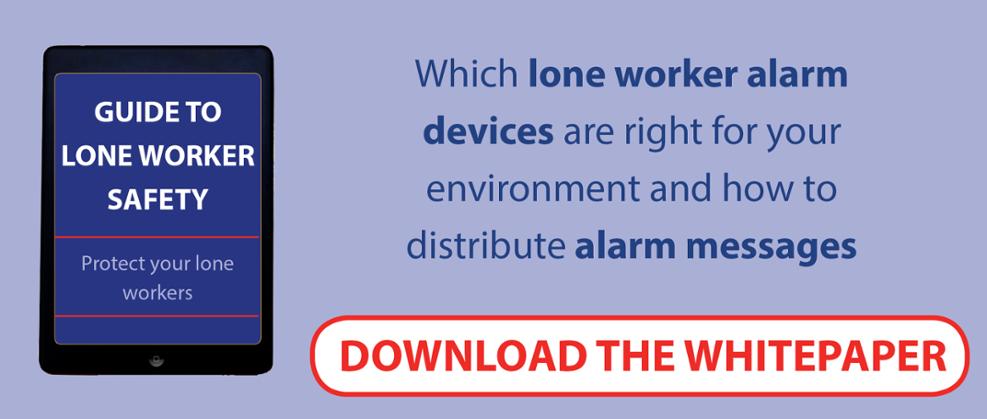
Lone workers throughout your manufacturing company are at a higher level of risk for accident and injury, not because their positions are intrinsically more dangerous, but because they are out of contact with other people throughout the course of their daily business responsibilities. By implementing a lone worker tracking system, you acquire a number of key benefits that will minimize risks and keep your business flowing more smoothly. The benefits of this system begin with risk management, but they don't end there.
1. Reduce Risk to Lone Workers
If a lone worker has an accident or gets sick suddenly on the job, minutes matter. The longer the injury goes untreated, the greater the likelihood that it will become serious or cause even more long-term problems. A fast response in the event of a head injury can prevent further brain damage, while acting quickly in the event of other injuries can reduce the quantity of blood loss, save limbs, and in many cases save lives. Your lone worker tracking system substantially reduces the risk to your lone workers, allowing them to continue their daily tasks with a greater measure of safety. Lone worker tracking also comes with a plan for who will respond in the event of an emergency: other lone workers, managers, and employees working nearby are all excellent resources.
2. Know Where All Your Workers Are
Lone workers often work on their own schedules. Even when they work exactly according to schedule, you might not know exactly where they are at any given time. A lone worker tracking system allows you to keep track of all of your employees in case an alarm is raised. That means that if there's a reason to shut down a specific area or you need to send help to the person in danger, when an alarm is sent the lone worker tracking system will allow you to find that person quickly and easily. That means there's less risk that a lone worker will end up hurt or stranded for hours simply because no one knows where they are.
3. Are mobile phones the best solution for you?
In today's technology-driven society, many people think that mobile phones are resource enough for lone workers no matter where they're going. This may be the case, and lone workers could use these for safety, but mobile phones are not necessarily suitable in all lone worker situations. Before going for this solution and make your lone workers solely reliant on them, you need to consider a series of factors:
- Is there good phone coverage in the area your lone worker operates?
- What would happens if the user slips and is rendered unconscious?
- Does your lone worker use gloves? In that case, touchscreens will not be suitable.
- Does your lone worker operate in hazardous ATEX environments?
Although mobile phones are an option, you must first make sure that they are suitable for the conditions of your specific lone working employees, as they might not be enough to ensure their safety.
Click here to read more about lone workers
4. Give Employees More Confidence and Security
Employees are more likely to use a system that they know works. When you implement a lone worker tracking system, you let your employees know that you care about them and that you're willing to go the extra mile to ensure that they're taken care of. Your lone worker tracking system should be:
- Comprehensive, with a guide to cover as many scenarios as possible
- Inclusive of both the reasons why tracking might be necessary and how responses will be handled under those circumstances
- Usable by all employees, no matter where they are
Your lone worker tracking system will let your employees know that you care about the dangers they might face throughout the course of their work day and give them the confidence that in the event of a problem, your company will respond quickly and efficiently in order to ensure that they're cared for. When an employee knows that there is a working solution in place, they'll be more likely to use the system to call for help when they need it.
5. Protect Your Business, Too
Businesses that have frequent accidents on the job--especially those that aren't handled quickly and efficiently--have a number of problems. First, they often aren't able to keep quality workers who will be willing to continue taking those risks. Second, they face insurance and liability risks, especially if workers are injured, then go for a long time without treatment. This is particularly true if you're aware of potential problems, but choose to do nothing to protect the employees throughout your manufacturing company. Installing lone worker tracking systems will help protect your business, letting employees, insurance companies, and legal representatives know that you care about the company's employees and what happens to them.
Installing a lone worker tracking system in your manufacturing company is one of the best ways to ensure employee safety, keep track of all of your employees, and reduce response time in the event of an injury or accident. If you don't know where your employees are or can't tell what's going on in their work space, you can't help them. Lone worker tracking systems, however, provide your employees with an additional layer of protection that will increase their confidence and make it safer for them to continue to work without direct oversight or supervision.





